SO LONG AND THANKS FOR ALL THE FISH!
....Or as the UK prepares to leave the EU, Martin (at least in his heart and mind) prepares to leave the UK.
Just in case anyone doesn’t recognise the words of the title, they come from Douglas Adams’ seminal science fantasy series, “The Hitchhiker’s Guide to the Galaxy”. They are attributed to the world’s dolphins, as they escaped the planet just in time to survive its destruction to make way for a hyperspace bypass. The manner of their escape was never properly explained, but it was presumably via one of those elusive wormhole things. Well, it turns out that Martin has a wormhole of his own, and he too intends to use it!
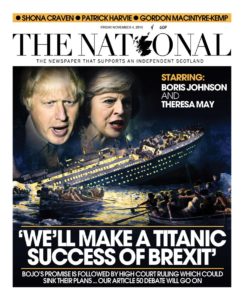
But first, I thought I should put on the record what especially motivated me to write this blog now. As has often been pointed out before, it’s dangerous to make predictions, especially about the future, so I’m definitely not going to try to do so here. However, it is nevertheless useful to observe in which direction the wind is blowing, and in this connection I’ve just heard that sadly, this year’s Advanced Microscopy course in Plymouth has had to be cancelled, primarily because of a collapse in applications from the continuing European Union. One snowflake doesn’t make a winter, but is this nevertheless a harbinger for the real future status of the new “global Britain”? Those of us who are currently sailing in this particular ship should perhaps be excused for checking out the status of the lifeboats in advance of what may be the looming iceberg, as I am now doing….
So where is my lifeboat? I’d held out from using it before now, as I had hoped that the UK would somehow come to its senses and stay in the EU, and it felt rather disloyal to do so before the ship was definitely sinking. But now that it’s indeed slipping beneath the waves, it does free me to head for the shores with a clear conscience. Perhaps like other wormholes, this one wasn’t even immediately visible, and my first recognition of it was merely in the form of a lighthearted speculation. But then as time went on, its reality became ever more apparent, and yet it was created for me by someone whom I’d never even met.
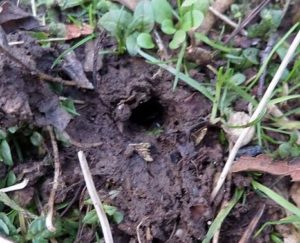
Here’s a photo of a REAL wormhole
Time for some family history! I knew quite a lot about my father’s side of the family, as although he was an only child, he had an impressively large number of aunts, uncles and cousins, many of whom I had met in my own formative years (for anyone who cares, we’re talking about the Forest of Dean area here). On my mother’s side though, I only met my grandfather, although I do remember him talking about several brothers and sisters (we’re talking about Kent and East Surrey here). My maternal grandmother had long since died, and my grandfather had remarried, so this combination of circumstances did make it rather more difficult for a young lad to enquire about this side of his ancestry. My mother never spoke about any of this at all, whether because of sadness or because she didn’t think I would be interested, I did not know. But there it was. All I did know was that she came from Ireland.
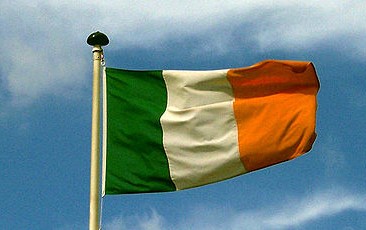
So there’s the wormhole. I already thought I knew – and I now know that it is indeed the case – that having an Irish grandparent is sufficient to qualify you for Irish citizenship. Originally it was just one of those things that it was nice to know, but perhaps of no practical benefit if, as in my case, you already had a British passport. But now that is no longer true! The UK is leaving the EU, but Ireland is staying. Martin personally wants to stay in the EU too, so the solution is for him to become Irish.
What I find so fascinating about it all is that this potential change is likely to be far more than just a nationality change of convenience. I think I have a strong sense of personal identity, and also from my connections with and travels to the “mainland” I also have a pretty good sense of what it means to be a European (I even speak three EU languages as well as this one, which will be the subject of a future blog), but as to being British???? What exactly does THAT mean nowadays? We (or should I say THEY in my future incarnation?) seem to think that the UK is still some sort of social democratic country, but the pretence is perhaps maintained only by the continuing existence of the BBC and the NHS, both of which are under threat. All the public services were long since flogged off, rented housing is increasingly under the control of private landlords rather than public authorities, higher education now costs a fortune, and steady jobs with defined pension schemes are becoming a distant memory. No thanks to ANY of that! However, what is ALSO fascinating is that the coming generation are seeing this as clearly as I do, so let’s hope that a new and nicer country will emerge in due course. But sadly, not just yet, as I suspect a lesson needs to be learned first, and at least in emotional terms I’d like to view it from the outside rather than the inside! I’m afraid we’ll have to wait until the UK’s current political leaders shuffle off their mortal coils before things can be put back on course, by which time I won’t be around either, so that has to be a task for others now. Good luck!
But meanwhile Martin still has lots more to do, so he embarks on establishing his new identity with enthusiasm as well as sadness. Actually I’ve been interested in Irish affairs for many years, ever since doing my postdoc in Boston in the late 1970s [Weirdos from another planet blog] [the first 30 years are the worst blog]. That city has a significant Irish-American population, and the “troubles” were raging pretty strongly then, so I was sometimes asked for my take on the situation. My attempts to explain it in as pragmatic a way as possible, without formally taking sides, made me realise what a mess it all was, so I couldn’t help but follow its further developments with some interest. I’m certainly not going to make any political comments here, but I nevertheless will say that in my opinion it took a surprisingly long time for people to stop fighting and start talking, but of course that did happen eventually.
I have yet to visit the north, but I’ve been in the Irish Republic several times since the 1990s, originally for business reasons, and I was initially quite surprised to find it a much more progressive place than I’d expected. Having escaped from the UK in the 1920s, it arguably fell overly under the influence of the Roman Catholic priesthood for the next few decades, but by the 1990s that seemed to be changing fast, as the locals confirmed when I told them of this impression. Hmm, I could quite happily live here after all, I thought, although something really did, and still does, need to be done about Dublin traffic.
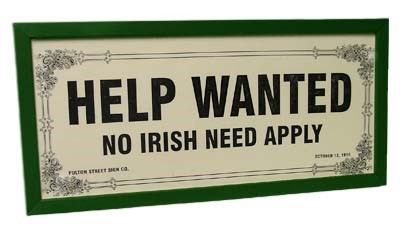
Oh, how things can change! In the earlier years of the last century, the state of their economy was such that their main export was people, who were correspondingly underappreciated, and in London and elsewhere it was common to see “NO IRISH” outside possible places of casual employment. I therefore cannot help but wonder, if Brexit goes too badly wrong, whether signs will one day appear on Dublin streets saying “NO ENGLISH”. (And maybe on Belfast streets too, given that one of the side effects of Brexit may be to encourage Ireland to get back together again.) Well, you never know!
But this gets me right back to my own ancestry, as one of the few things I did know about my grandmother was that my grandfather met her when she was in domestic service in the London area. She too must have come over here in search of work! As for any further information, the only currently living source has been a rather older cousin on my mother’s side, who could recall that her unmarried surname was Morrow, and that she came from near Killeshandra in County Cavan, close to the border with Northern Ireland – although of course no such border existed in those days. Not much to go on, but the registration details for her marriage to my grandfather were going to help a little more. From finding them online I learned that her full name was Annie Eliza Morrow. However, the grail that one needs to provide for Irish citizenship purposes is her BIRTH certificate, which must also show details of both parents. That could be much harder.
Or perhaps not. One of the good things about the internet is that everything in life is now much more searchable (by oneself as well as by snooping powers-that-be, that is), and this has contributed to a general explosion of interest in where we all came from. Probably the best-known resource is the Ancestry website, which grew out of an exercise by the Mormon church to try and identify as many people as possible who had ever lived, so that they could be retrospectively baptised and would hence be able to progress to whatever comes next (how nice!). Needless to say, although my own soul must by now be impossibly compromised, I signed up as soon as my citizenship quest began, but there are other useful sources too. By internet querying the geographical distribution of the Morrow surname I discovered the official Irish genealogy website, and by entering there the limited amount of information I had, I found the birth registration details of one Annie Morrow, daughter of Robert and Eliza Morrow, and born in the right area and around the right time (1880).
Wow, wasn’t that easy! The next step was to obtain the certificate for her marriage to my grandfather Edward Agate, about whom I knew much more, so that was easy too, but it turned up a problem. I found the flowery italic script in these documents difficult to read, but the first name of her father on that certificate definitely wasn’t Robert! And another complication arose when I checked the 1911 census records, which were easily found because I knew exactly where the family lived (the Agates were there for just over a century!). Their record explicitly showed Annie to be of Irish origin, but to have come from County Leitrim rather than County Cavan. Had there been a county boundary change meanwhile? Not a silly thought, as some Irish county boundaries had indeed changed, but not this one!
Then I remembered that the name Killegar had also been associated with her, so what or where was that? A map of Ireland showed me that Killegar was a hamlet, just big enough to have a church, and located a few miles to the west of the significantly larger Killeshandra, but that was indeed far enough to place it in Leitrim rather than Cavan! So I’d been looking in the wrong place for her records, as Killeshandra was effectively the “postal town” rather than the “local government” one. Time to look at the Leitrim records instead!
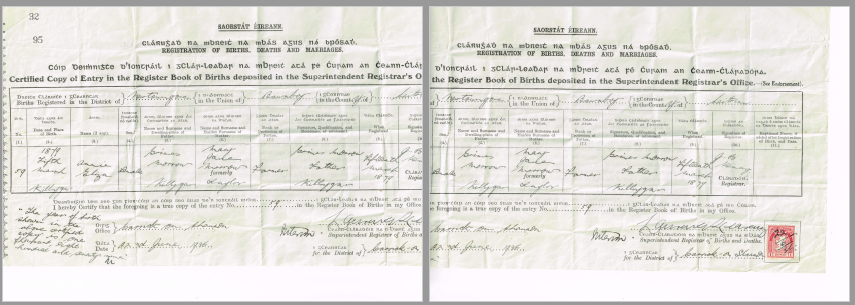
But this was overtaken by one of those strange coincidences in life. In my last blog I told the tale of my sister, who had carried on living in the old family house after our parents had died. Now that she is also no more, I’ve been going through the house contents in preparation for putting the place on the market, and this has meant going through some of my parents’ personal effects as well as Shirley’s. To my amazement I found on my latest visit just a few days ago, at the bottom of an otherwise uninteresting drawer, a certified copy of Annie Eliza Morrow’s birth certificate! You just can’t make this sort of thing up. And although the name of her father was also tough to decipher, it looked like an identical squiggle to the one on her marriage certificate (census and other documents that I found online later showed it to be the very unusual name of “Grimes”), so I was therefore truly back in business.
Coincidences like these can make you feel that something strange is going on, but I’m afraid there is a much more prosaic explanation. It’s actually something that I’ve already personally called the “grandmother effect”, following a wonderful talk by the astronomer Carl Sagan which I went to during my postdoc years in Boston. As part of his debunking the paranormal, he gave the example of a young lad who woke up in a cold sweat one morning, because he dreamed that his grandmother had died. So he phoned up to find out how she was, and guess what? She was still alive! Of course for all the boys dreaming this sort of dream, sooner or later someone may strike unlucky, and it’s only those cases that you will ever hear of. To get a further feel for this type of issue, I can strongly recommend “How Not To Be Wrong” by Jordan Ellenberg. For every strange coincidence such as this one, a gazillion other strange coincidences that could have happened last week actually didn’t. So if you look at things from this perspective, strangely rare events are the norm – but you just don’t know which are the ones that will actually happen.
But this nevertheless begs the question of what that certificate was doing there. It wasn’t contemporary with Annie’s birth, having apparently not been issued until 1936. It was also countersigned to confirm that she was born in March 1879, but her stated age on her marriage certificate in June 1904 was 24, whereas this would have made her 25. Aha! It looks like she had been knocking a year off her age, and that birth certificate had been issued as part of her being rumbled, but I may never know why this should have come to light after so long. But in some ways it’s nice not to be able to solve every mystery!
So now it’s just a question of “joining the remaining dots” to link her to me. I now need an official certificate for her death, certificates for the birth marriage and death of my mother (who was their daughter of course), and then just one for my own birth (as I haven’t married or died yet). These have all been applied for, and some are already here. And although perhaps not admissible in this particular “court”, there is also the DNA side of things that the Ancestry site can also provide. Theoretically that should show that my origin is 25% Irish, but thanks to a Christmas gift a few years ago, and for which the results are regularly updated, the current estimate is actually 38%, so I guess I’m even more Irish than I thought (but why – an overdose of my mother’s genes, or is there something else to discover?).
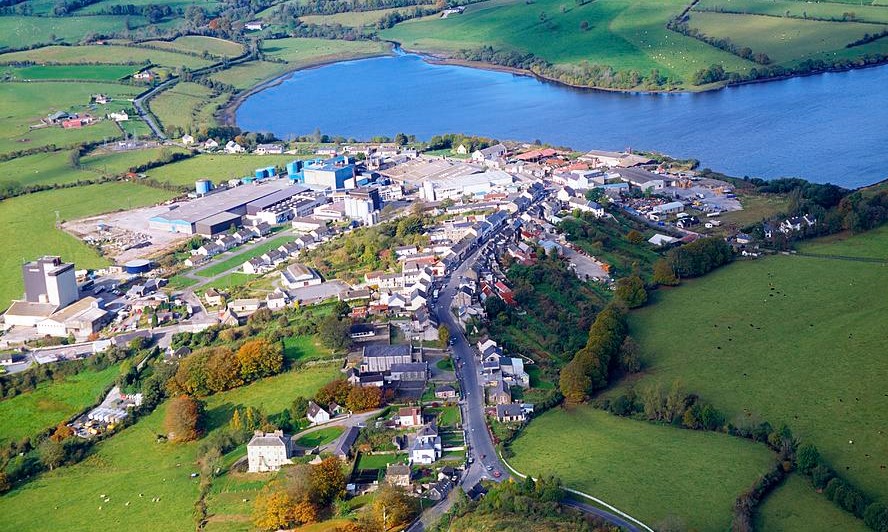
Killeshandra
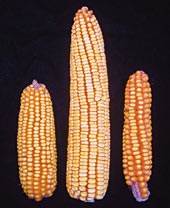
Hybrid vigour
Well, I can now finish this blog on the same topic as I started. The cancellation of that microscopy course means that I will no longer be going to Plymouth this spring, so I think I’ll visit that part of Ireland instead. Although this knowledge wouldn’t be necessary for my becoming Irish, I’ve always been intrigued as to whether she had any brothers or sisters. Yes she did! Thanks to census information I now know she had three of each, so it’s quite possible that there are some living grandchildren in that part of the world. Might I be able to find any of them? The other thing I’m pleased to report is that this ancestral line is refreshingly “ordinary”, as the census information suggested that Grimes Morrow was a groundsman for a private estate, and that the family lived in rented accommodation there. As he explores his ancestry generally, in pedigree terms it seems that Martin is about as mongrel as they come, but seeing what excessive inbreeding can do to both dogs and humans, this suits him down to the ground. He’d much rather have a bit of hybrid vigour any day!




